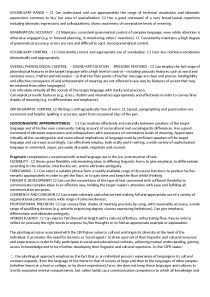LEU English Didactic



In the first sense. In the second sense. Being an English teacher qualities of a good teacher , a teacher’s roles , professional development. Communicative language competences linguistic , sociolinguistic , pragmatic and pluricultural plurilinguistic. A1 C2 levels Linguistic. Planning and English lesson planning individual lessons and units of instruction. Factors to consider when planning lessons. Reasons for Planning Lessons. Stages of Planning Instruction. Planning a Unit of Instruction. Characteristics of Thematic Units. Five Steps for Planning a Thematic Unit. Examine syllabus and curriculum standards and required units for the class. Choose a theme that is meaningful , relevant and interesting to learners. An Example of a Theme Food and Drink Eating Out Eating out with Friends. Brainstorm ideas that can incorporate real life situations and tasks use a web , a chart , a list. Activity for the students Brainstorm ideas for the theme “ Eating Out with Friends ”. Choose , organise and order the activities. Activity for the students. Incorporate projects that can encourage learner choice and autonomy. Activity for the students Develop a task for a students’ project “ Eating out with friends ”. A Project Idea Creating a Cafe. Reported Speech – arrange over a period of time.
The conception of didactics: a short overview of the development of the concept ‘didactics’, its modern definition. Content of didactics. Content of English language teaching/learning (Vocabulary, grammar, pronunciation, text discourse)
The process of teaching and learning = the art and science (thinkers of old Greece, 7th-6th cent. BC)
First mentioning – 1613 (V. Ratke and J. A. Comenius)
J.A. Comenius – developer of the teaching theory, founder of the science of didactics
General didactics analyses the teaching and learning process in terms of its:
Special (subject) didactics – teaching / learning of individual subjects
Institutional didactics– teaching / learning in different education cycles (levels)
(Didactic) principles of teaching / learning teaching / learning content (what to teach?)
Ability to motivate students. Mentor and a guide. Patient. Are knowledgeable of their subject matter and have very good classroom management skills. Caring, creative, enthusiastic, patient, well-planned, respectful. Knowledgeable of their subject and the craft of teaching. Convey a passion for what they are teaching and for their students learning achievements.. Creative and flexible, fair, treating everyone equally. Shows respect for students. Encourages to ask questions. Knows that different students have different needs. Build good rapport with their students.
Participant ( Sometimes the teacher may need to participate in class activities. ( Care must be taken not to be over-dominant.
Planning and English lesson: planning individual lessons and units of instruction.
Organize the ideas/activities into a chart, pointing out the real-life task, skills to develop and language content
Step 1: Each group of 4-5 learners create a café (type of cuisine, type of dining, name, food and drink menu, a map with directions)
Step 2: During a lesson at the end of the unit (Restaurant Day) cafes are set up in different parts of the classroom. Students visit the cafés and make reservations, give directions, host a group eating out. Send each other thank you notes.
Sample real-life situations: retelling a conversation on the phone, in a film, in a book, at a party, at a lesson etc.
Learners’ needs, interests (general age-related, specific likes, dislikes, hobbies, strengths, favourite past time activities, future prospects...)
Current events (e.g. European Day of Languages – films about history of English; February 16 – how other countries see our independence, how they celebrate own independence days; Pancakes Day – traditions worldwide; Christmas – decorations, dishes)
Individually, learners will write a story of 7-10 sentences using Past Simple, Past Continuous and Past Perfect Simple correctly.
In pairs, learners will discuss several ways to spend an evening and will come to a mutual agreement.
Appropriately staged – warmer, introduction, PPP, summary, setting hw (logical sequence, build on previous knowledge)
CB+WB+TB, recordings, pictures, photos, maps, crosswords, (flash)cards, handouts, realia, multimedia, TV / DVD, internet resources, educational software...
5.. Classroom management: seating arrangement, organising students, problems in the classroom and ways to solve them (classroom management techniques), monitoring, reasons for monitoring.
















